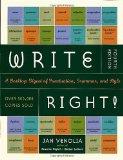
First off, a confession: my copy of Write Right! (yes the exclamation mark is part of the title) is very old. As in very, very old. It's so old that the spine has faded. It's so old that is was written pre-emails and internet and all those other things we take for granted. Texting wasn't even a word.
So I thought I'd better check that it even still exists. Turns out that not only does it still exist, but it has been updated for the electronic age. It used to start with an introduction in which Venolia explained that as an editor she found that people made the same grammatical mistakes over and over, and that she couldn't find a suitable desk reference book to recommend so she wrote her own. Now it starts with a question: "Does good writing matter any more?"
This shows how much how we view the written word has changed in the last few decades - and it is the internet that has wrought much of that change. Venolia would possibly be horrified at my first paragraph: its casual way of writing is far from grammatically perfect. It's also the most common way to blog. You would be surprised to read a blog where every sentence had all its parts intact - every one with a subject and verb. So in blogging I can get away with: "As in very, very old." I can also get away with it in fiction. These days, most fiction writers include fragments of sentences in their prose.
My word-processor's spelling and grammar checker often grumbles about my grammar. It doesn't yell, or tell me I am an idiot. It just underlines in green. But I have no plans to change the fragments it doesn't enjoy. Like most writers, I use them to create emphasis, and to mimic the rhythm of speech or thought.

It's no good relying on a computer's grammar checker. As I demonstrated in this article, grammar checkers often get it wrong - sometimes with very funny results. I'm pleased to report that Venolia agrees with me. For this very reason she says: "Though spell-checkers are useful, grammar-checkers are more a nuisance than a help."
That's where books such as Write Right! come in. The book covers punctuation and grammar, and it has some very useful tips on style and on language. Do you know your "alludes" from your "eludes"? Your "ante-s" from your "anti-s" (or even your aunties?") If you don't, Venolia explains all, along with many other commonly misused words.
In her introduction Venolia makes the point that most readers will eventually be able to work out what is meant even in a poorly written sentence, but says this is wasting readers' time and that "Clarity and precision are always desirable." She also says it is important to retain the richness of the English language and that by not taking care to use words correctly we risk losing that.
The new Write Right! goes into more detail than my elderly copy does, and so is 224 pages, rather than the 126 pages of the older version. The new section on verbs is definitely worth a read. As well as the usual advice you'd expect to find in a book like this - on tenses or active or passive voice, there is also a section on mood. This is not about how to create mood with verbs, for example using "shouted" or "whispered" instead of "spoke." It is about whether verbs are: "matter-of-fact, commanding or hypothetical." Of these three moods, I'd say that hypothetical (or subjunctive) is the one that most often causes confusion and Venolia takes time to explain it. She also explains gerunds (verbs ending in …ing), participles and irregular verbs in an easy to understand manner.
Most writers, no matter how good their education, get confused about some aspects of grammar or confuse the meaning of words. Write Right!: A Desktop Digest of Punctuation, Grammar, and Style easy to read and carefully indexed format makes it very easy to clear up that confusion.
<br /><img src="http://wms-na.amazon-adsystem.com/20070822/US/img/noscript.gif?tag=wriitingariver-20" alt="" /><br />

